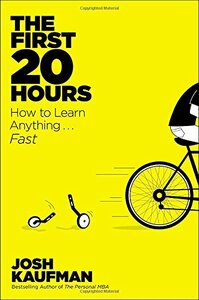Take a photo of a barcode or cover
it’s pretty good, i just got bored at the parts where he was explaining how he used his tips. his explanations weren’t boring, i was just expecting him to expand more on the tips rather the examples. maybe i’ll finish it if i read it again
This is another book which should have been just a blog post.
The main ideas:
• Choose want you want to learn and deconstruct it into the smallest possible sub-skills.
• Learn enough about each sub-skill to be able to practice effectively and self-correct.
• Remove any physical or emotional barriers that get in the way of practice.
• Practice the most important sub-skills for at least 20 hours, even if it is a drag.
The main ideas:
• Choose want you want to learn and deconstruct it into the smallest possible sub-skills.
• Learn enough about each sub-skill to be able to practice effectively and self-correct.
• Remove any physical or emotional barriers that get in the way of practice.
• Practice the most important sub-skills for at least 20 hours, even if it is a drag.
hopeful
informative
inspiring
reflective
medium-paced
The intro chapters about rapid skill acquisition are definitely worth reading
I keep a list of things I want to learn to do, but never get around to it, or start and never finish. This book was encouraging in that it provided a way to approach learning new things without getting overwhelmed. I definitely recommend this for curious minds.
A decent read, although not as good as his other book The personal MBA, which is one of my favorite..
The book is basically based on simple practical techniques and principal, which enables us to learn any skills very quickly, the good part is that the other has himself tried those techniques, and learned 5 to 6 new skills, which he also illustrate on the book that how he learned those skills in less than 20 hours, following were those skills
1. Programming
2. Touch typing
3. Go game
4. Wind surfing
5. Ukelele
Downside of this is that I think the author has exaggerated the book, because the techniques that he thought were very sound and sold, only one example would have been enough for the sake of illustration, and with this the book would have been easily under 100 pages.. then I would have rated it 5/5.
Having said this, I still rate the book very high, because it is very practical one, Josh kaufmann is by the way a brilliant writer, his story telling and writing skills are just sublime.
The book is basically based on simple practical techniques and principal, which enables us to learn any skills very quickly, the good part is that the other has himself tried those techniques, and learned 5 to 6 new skills, which he also illustrate on the book that how he learned those skills in less than 20 hours, following were those skills
1. Programming
2. Touch typing
3. Go game
4. Wind surfing
5. Ukelele
Downside of this is that I think the author has exaggerated the book, because the techniques that he thought were very sound and sold, only one example would have been enough for the sake of illustration, and with this the book would have been easily under 100 pages.. then I would have rated it 5/5.
Having said this, I still rate the book very high, because it is very practical one, Josh kaufmann is by the way a brilliant writer, his story telling and writing skills are just sublime.
I feel hoodwinked.
The promise of this book and what it actually delivers are worlds apart. And for that, I am furious.
The main idea is basically that nobody has time for the 10,000 hour rule popularised by Malcolm Gladwell. Most of us want to learn new and interesting skills, not to be elite world class practitioners of those skills, but for fun, out of interest or to help us do something else.
Enter the concept of rapid skill acquisition.
Josh Kaufmann proposes that it only takes about 20 hours of very focused practice to become proficient at a new skill at a level above amateur. Fair and fine.
My gripe is that the author doesn't really expand on this. Sure, he lays out the principles of rapid skill acquisition and how to learn effectively, but the majority of the book describes his process of learning various disciplines. This would be fine if you're interested in stuff like yoga, windsurfing or playing the ukelele. I am not. As a result, only the first 20-30 pages were of any use to me.
While I like the concept and will probably try it for myself, I don't think this book should have been a book. A series of blog posts would have done the trick.
Instead of reading this whole book, I'd actually recommend watching Kaufman's brilliant Ted Talk on the subject here: https://www.youtube.com/watch?v=5MgBikgcWnY
This pretty much covers the key aspects of everything he talks about in the book and is only 20 minutes long.
The promise of this book and what it actually delivers are worlds apart. And for that, I am furious.
The main idea is basically that nobody has time for the 10,000 hour rule popularised by Malcolm Gladwell. Most of us want to learn new and interesting skills, not to be elite world class practitioners of those skills, but for fun, out of interest or to help us do something else.
Enter the concept of rapid skill acquisition.
Josh Kaufmann proposes that it only takes about 20 hours of very focused practice to become proficient at a new skill at a level above amateur. Fair and fine.
My gripe is that the author doesn't really expand on this. Sure, he lays out the principles of rapid skill acquisition and how to learn effectively, but the majority of the book describes his process of learning various disciplines. This would be fine if you're interested in stuff like yoga, windsurfing or playing the ukelele. I am not. As a result, only the first 20-30 pages were of any use to me.
While I like the concept and will probably try it for myself, I don't think this book should have been a book. A series of blog posts would have done the trick.
Instead of reading this whole book, I'd actually recommend watching Kaufman's brilliant Ted Talk on the subject here: https://www.youtube.com/watch?v=5MgBikgcWnY
This pretty much covers the key aspects of everything he talks about in the book and is only 20 minutes long.
informative
fast-paced
All nonfiction March: Book 2
I've always found it easy to acquire new skills; I don't why I'm reading this. I just wanna see what the author has to offer in this book. I have low expectations, though.
..........
2.5 stars
Not really useful
I've always found it easy to acquire new skills; I don't why I'm reading this. I just wanna see what the author has to offer in this book. I have low expectations, though.
..........
2.5 stars
Not really useful





